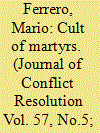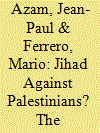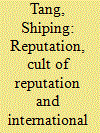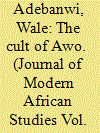| Srl | Item |
| 1 |
ID:
124142


|
|
|
|
|
| Publication |
2013.
|
| Summary/Abstract |
This article suggests a rational explanation for extreme voluntary sacrifice in situations in which the state of the world when the decision must be made is observable only by the agent. Such explanation is the cult of martyrs, heroes, and saints. This cult may get out of control and fuel fanaticism, or excessive sacrifice from the standpoint of the sponsoring organization. A survey of the historical evidence of Christian martyrdom strongly suggests that martyrs were driven by the expectation of a cult in this world, not by otherworldly rewards. In particular, it is argued that the evidence of excess martyrdom in both Muslim Spain and the Roman Empire strongly speaks for the cult theory.
|
|
|
|
|
|
|
|
|
|
|
|
|
|
|
|
| 2 |
ID:
168859


|
|
|
|
|
| Summary/Abstract |
This paper addresses the waves of mass killings recently perpetrated by individuals with a weak or nonexistent ideological motivation, whose acts either appear to contradict their purported political cause or are admittedly driven by a quest for notoriety. Examples range from killers who have been waging jihad against European Jews to unattached mass killers such as the Germanwings pilot to the perpetrators of mass school shootings in America and worldwide. We argue that these phenomena can be understood as instances of the Herostratos syndrome, which has been known for thousands of years as characterizing the behavior of people who seek to survive in the collective memory by excelling in their infamous acts. We provide a model of hybrid killers which accommodates the Herostratic motive alongside a political motive and characterize a well-behaved Nash equilibrium where Herostratic killers are competing with one another with a view to make a name for themselves in infamy. The policy implications point towards reducing the publicity the killers enjoy, thus frustrating their quest for notoriety.
|
|
|
|
|
|
|
|
|
|
|
|
|
|
|
|
| 3 |
ID:
069868


|
|
|
|
|
| Publication |
2005.
|
| Summary/Abstract |
Building on recent scholarship on reputation in international politics, this article argues that, because reputation for resolve cannot form in international conflicts due to anarchy, politicians' persistent belief in the value of reputation for resolve is merely a cult of reputation. After outlining the logic of the cult and an operational code derived from it, this article examines the pattern of influence that the cult has exerted on state behavior in conflicts. It then explores the possible cause of the cult. Finally, it proposes that integrating structural and psychological factors may be a productive enterprise for understanding state behavior, and that further work along this line may lead to interesting findings.
|
|
|
|
|
|
|
|
|
|
|
|
|
|
|
|
| 4 |
ID:
084470


|
|
|
|
|
| Publication |
2008.
|
| Summary/Abstract |
This essay examines the 'posthumous career' of Chief Obafemi Awolowo, the late leader of the Yoruba of Nigeria. It focuses on why he has been unusually effective as a symbol in the politics of Yorubaland and Nigeria. Regarding Awolowo as a recent ancestor, the essay elaborates why death, burial and statue are useful in the analysis of the social history of, and elite politics in, Africa. The Awolowo case is used to contest secularist and modernist assumptions about 'modernity' and 'rationality' in a contemporary African society.
|
|
|
|
|
|
|
|
|
|
|
|
|
|
|
|